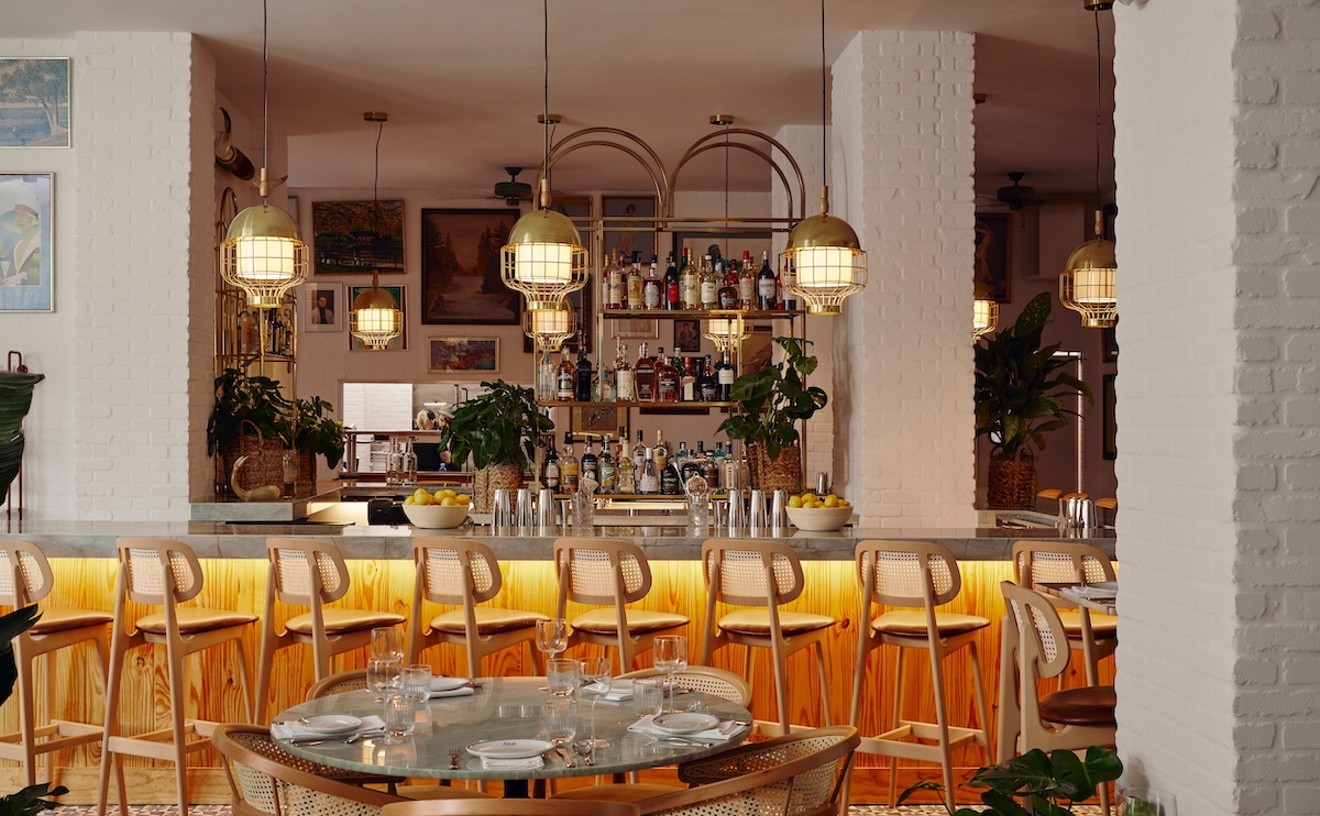Recent articles have explored some of the revenue-enhancing measures that restaurateurs have undertaken to counter rising food costs — smaller portions, cheaper ingredients, professional pickpockets to work the dining room, and so forth. Many establishments will no doubt also rely on Miami Spice, the annual discount-dining program that begins August 1, to help lure cash-strapped customers. But there is another way for savvy diners to save money when eating out: Visit mom-and-pop spots that don't overcharge to begin with. Jamaica Kitchen and Dewan Restaurant are two such places.
The two-month-old Dewan serves Indian and Pakistani halal food (permissible according to Islamic law); it curries business on the north end of the county, just off the corner of NE 167th Street and North Miami Avenue. Jamaica Kitchen has been simmering down south in the Sunset West Shopping Center for 22 years. Interestingly, both look about 22 years old. The former is larger (49 seats) and at night rather dark. A big-screen TV set in the rear is the focal point of an otherwise featureless room of tables and chairs, with booths lining one of the orange walls. Jamaica Kitchen is brightly lit and petite, housing just a single two-seat table and eight stools. Photos of about two dozen menu items are posted high on a wall, and coolers below beckon with a wide sampling of drinks (coconut water, ginger beer, aloe juice, Coca-Cola, etc). Imported Jamaican groceries are stocked on shelves in the back.
The mom and pop here are Cheryl and Anson Chin, a Chinese-Jamaican wife/husband team. They seem to know most of the customers, a steady stream of whom stroll in, place their orders at the main counter, and exit bearing plastic grocery bags that can barely contain the foods' aromatics — all to an island beat that bounces about in the background. Diners eating in also transact their meals at the counter. The workers here, many of whom are family, couldn't be nicer.
"Wi ah di bess!" is the motto, and when it comes to low-budget dining, the boast holds merit. Lunch and dinner get served all day, the latter of heftier portion and dished into a larger styrofoam container. Both come with fried planks of green plantains plus a heaping portion of pigeon peas and rice (which I love, although I've never had a version that I didn't think could use more peas). Lunches cost $6.50 to $8.50 (a little more for market-price fish offerings such as curry shrimp or ackee-and-saltfish); dinners run $8.50 to $10.50, with the same seafood caveat. All items are also available by the pint ($8 to $9.50) or quart ($16 to $18.50).
However you divvy it up, prices are recession-friendly — especially the one-quarter jerk chicken or quarter-pound of jerk pork, with bread, for $4.50 and $4, respectively. We tried both. Each passed muster on moistness and flavor, but neither possessed much piquancy. Heat-seekers needn't sulk, though, because bottles of various hot sauces are arrayed on a shelf up front.
No need for any devilish splashes on the mahogany-colored skin of a juicy, hacked-up Chinese roast chicken, whose meat bursts with buoyant five-spice fireworks — one of the best birds in town. Other Chinese-ish dishes include a stir-fry of pork slices and ham choy (a mustard green, cousin of bok); and suey mein, a big bowl of fresh chicken broth bolstered with pork, shrimp, some of that roast chicken, mustard greens, and an "egg roll," which is a thin egg crêpe steamed with ground pork and shrimp in the center. Back to the islands: Stewed beef, stewed oxtail, and curried goat are all tendered in tender, melt-in-the-mouth fashion — the last getting sauced most provocatively.
Homemade Jamaican patties come with seven types of fresh fillings — nine if you count "mild," "spicy," and "very spicy" beef as three — each enveloped in thin, soft pastry dough with a pale orange tint. Favorites were a cabbage-dominated vegetable version, a thyme-accented callaloo-and-saltfish rendition, and the aforementioned spicy beef, which was just that. If you're hoping to grab a seat at Jamaica Kitchen, you'd better go soon — in August, the restaurant will be featured on The Food Network's Diners, Drive-Ins and Dives with Guy Fieri.
The journey from Jamaica to India is a lot farther than that between patties and samosas. Dewan's vegetable samosa is a bright, thick tetrahedron of corn, carrots, onions, potatoes, and glints of coriander and chili. The kitchen was out of the beef version, so we tried boti kebab: grilled hunks of lamb crusted with a dark red yogurt-and-spice paste of garlic, ginger, cardamom, coriander, and turmeric (plus other such seasonings), and gilded with grilled turmeric-gold onions. The boti was especially toothsome when tucked into ghee-griddled paratha bread, or within drier, more pitalike rounds of tandoor-baked nan.
Dewan's charm lay in its Third-World ambiance and informality — which is admittedly not for everyone. The owners are Bangladeshi, and one of them, Nadem Mirza, will likely be on hand to graciously welcome you. He might also approach your table to ask what it is you'd like to eat, and perhaps offer to "put something together." If you consent, it will probably translate to the most familiar dishes — chicken tandoori, lamb biryani, and daal being the trio whipped up for us. All three were quite good — the chicken charred and moist, the lamb-and-rice aromatic, and the thick lentil stew richly spiced. On another visit, an equally gratifying but looser rendition of the last comprised small chickpeas (chana daal). The ghee-fried, egg-bound patty of minced lamb, onions, and piquant red chilies that composes a shami kebab shares more in common with egg foo young than what we think of as a kebab. Reviews at the table were mixed; this dish might have proven more popular if accompanied by chutney, as is tradition.
Nihari, popular in Pakistan, Bangladesh, and among Indian muslims, is known as "the breakfast curry" because workers sometimes start their day with it. Dewan's rendition is a stew of softly braised beef culled from the shank — the "curry" sauce being more like beef gravy and too obviously thickened with cornstarch. We much preferred the vegetable curry: a medley of carrots, potatoes, spinach, and onions flecked with fennel seeds and electric with amber-colored spices. The meat of a goat curry was tender but lacked curry flavor; it's possible our server brought us the wrong dish, but it was enticing enough for us not to care. As I say — very informal.
On one occasion, Dewan's TV set was tuned to CNN and blaring; they gladly turned the volume down upon request. To tell the truth, given that a plate of chicken tikka for three costs $9, and a credible gulab jamun just $1.25, I wouldn't have minded if the set was fixed on FOX. And when a "family dinner" that feeds four or five — including a plate each of shish kebabs and boti kebabs, nan bread, and a whole tandoori chicken — is $29.99, I might even brave American Gladiators braying in the background. On second thought, maybe not, but the point is that everything here is 10 bucks or less (cash only). Now that's Miami spice at a nice price.











